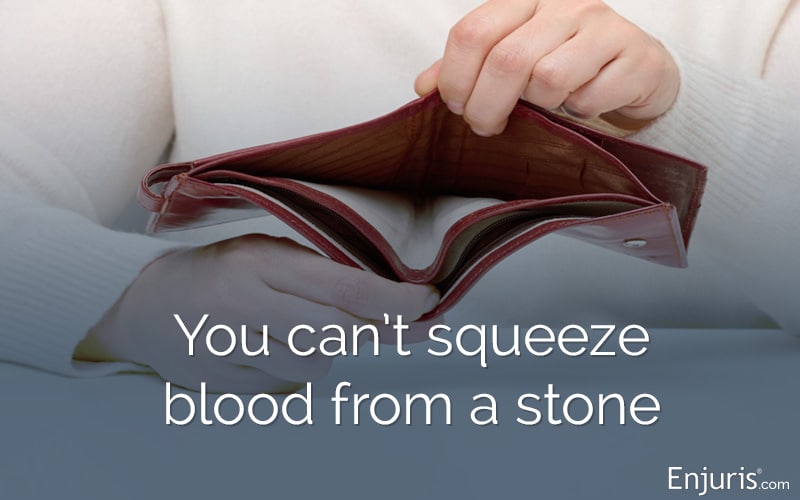
You thought that winning the lawsuit was the hard part, but sometimes recovering an award is more difficult
What if you successfully prove your claim and win an award… but the defendant doesn’t have the funds to pay you?
The purpose of a lawsuit is to recoup expenses from someone else’s negligence that caused your injury. A plaintiff (injured person) is intended to be made whole, or to be restored to the financial position they would be in if the accident or injury had never happened.
That means if someone’s negligent action cost you money, they should pay. While that makes sense in theory, a person needs to have money to pay money.
You have the legal right to sue someone whose actions cost you money. However, it’s not always practical or cost-effective to do so if they have no money or assets.
It’s possible to file a lawsuit and win, but it’s still difficult—or impossible—to collect the money if none exists.
Is the defendant absolved of liability if they can’t pay?
In some situations, yes. But usually not. They can still be held liable and financially responsible for the plaintiff’s injuries, even if they can’t pay immediately.
There are some limited circumstances when a defendant could be “judgment-proof.” That means their income is insufficient and they become exempt from debt collection and judgment. A plaintiff can’t pursue a claim against a person who is judgment-proof.
This could happen if the defendant has filed Chapter 7 bankruptcy, if they declared an exemption of income and assets, or if they earn protected income or federal government benefits. That could include a pension, child support, social security, unemployment benefits, welfare, Veterans’ Administration (VA) benefits and other benefits.
If the defendant can prove that paying the debt would leave them wholly destitute, they could be exempt from paying the judgment.
How to collect a judgment
A judgment is the decision ordered by the court that often involves a monetary claim or debt collection. The court orders a judgment against the liable party in order for the debt collector to retrieve money for the plaintiff.
Usually, this is a lump sum or series of payments to the plaintiff.
There are a few ways you might collect a judgment:
1. Bank levy
A debtor’s bank account or assets can be fined through a writ of execution. A sheriff’s officer will collect and distribute the money held from the bank.
2. Wage garnishment
If the debtor is not self-employed, the court can order that up to 25% of their earnings could be withheld from their salary.
3. Vehicle levy
The sheriff may sell or auction a vehicle belonging to the debtor.
4. Keeper levy (levy on business assets)
The sheriff may seize and retain control over the debtor’s businesses and assets.
5. Till tap levy
This is direct seizure of money from a business’ cash register by a U.S. Marshal or deputy. The money seized would be provided to the plaintiff (creditor).
6. Levy on personal assets
If it’s impossible to garnish wages or collect business assets, you might be able to levy the defendant’s personal property like real estate, stock investments, possessions, etc.
The courts won’t take these items from the defendant, but the funds are sent to you when they sell them.
Should you sue someone who has no money?
You can try. If they have no money but they do have insurance, then it could be worth it because the insurance company would pay your damages if your claim is successful.
If you get a lien on the defendant’s money or property, you need to keep track of when it will expire. If the lien expires, you could miss out on ever collecting the money unless you renew the judgment. Each state has its own time period in which a lien expires, so it’s worth checking on the statute of limitations for a lien in the jurisdiction where you filed your lawsuit.
The big question often becomes… is it worth it to you?
It could cost you thousands of dollars to seek a legal judgment—even though your lawyer likely works on a contingency fee basis (which means they don’t get paid until you receive an award), you’ll still need to pay up front for court fees, expert witness fees, sometimes travel, and other expenses. That could add up, and if the defendant can’t pay, then you’re shelling out a lot of money out of pocket with no return.
Also, you might have a hard time finding a lawyer to represent you if the defendant does not have any money. One of the first things your lawyer will do is assess the defendant’s financial status. Let’s face it… lawyers don’t work for free. They don’t want to spend their time and their staff’s time on a case that will never result in a paycheck—they’d rather devote that time to another client’s case that will likely yield a payout.
Sometimes, you have to do your own cost analysis (or your lawyer might do it for you). This usually involves asking yourself what your costs are (financial, emotional, personal) as compared to what you stand to gain.
If you’re not sure, it’s best to seek guidance from a qualified personal injury lawyer. They are experienced and knowledgeable, and they can provide you with assistance in finding the best path forward.
